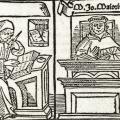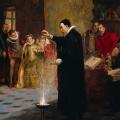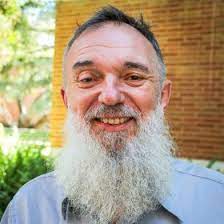431. Calvin Normore on Scholasticism
A discussion of the history and philosophical significance of scholasticism from medieval times to early modernity, and even today.
Themes:
Prof Normore's faculty page with a list of his extensive publications:
https://philosophy.ucla.edu/person/calvin-normore/
Note: at about 15:30 in the episode there is some logic that goes by pretty fast in our discussion, after I mention the inference "If P, then P". I think what Prof Normore says can rightly be captured as follows:
If P, then if not-P then P [so the idea here is that if we assume something is true, then any conditional with it as a consequent will be true, even one whose antecedent is its own negation]
If not-P then P, then P [so the idea here is that if something's negation implies it, then it is true; after all either it is true, in which case it is true, or it is false, in which case it is true because its negation implies its truth]







Comments
How do you plan on covering the Later Scholastics in 1600-1800 ?
Professor this interview has peaked my interest on the Later Scholastics, obviously you are going to cover them extensively in Iberian Philosophy next year but what about them when we move on to 1600-1800 during the rise of Early modern Philosophy. It seems like we've been covering the Scholastics for nearly a decade now and sadly the later ones aren't properly focused on
https://historyofphilosophy.net/scholasticism first time it was mentioned back in 2014 December. Crazy isn't it, props to your great dedication to this series professor
Have you already begun to plan your tentative episodes for the first section on 1600-1800 France/Low Countries/Iberia + Italy?
Also I left a comment regarding Later India being the next series you focus on Classical China right here
https://historyofphilosophy.net/comment/14132#comment-14132
In reply to How do you plan on covering the Later Scholastics in 1600-1800 ? by dukeofethereal
More scholasticism
Yes listening back to this, I was worried that some might think that this was us saying goodbye to scholasticism, but as you say it isn't - actually there will be quite a lot in 2024 in our coverage of the Iberian Renaissance. I really don't know enough detail about scholasticism in the 17-18th centuries to make an intelligent guess about how that will fit in, but at the very least as a target of people like Descartes and Hobbes! And to make that make sense we'll have to check in and talk about what was actually going on that could have been provoking them into such attacks.
Thanks for your input on the future series, too!
In reply to More scholasticism by Peter Adamson
Do you have a tentative list of 1600-1800 France>
Professor do you already have a vague idea or tentative list for the episodes on your next great mini series on 1600-1800 Europe, in particular the 1st sub series focusing on Iberia/Italy + France/Low Countries? How many scripted episodes do you think it will take to handle that, as Descartes/Spinoza/Pascal/Rousseau alone will have substantive focuses 5+ scripted episodes on each, perhaps for Descartes it might reach 10+ like how you handled Aquinas/Ockham/Augustine/Aristotle/Plato, etc..
Whilst trying to add other focuses like Pierre Bayle, Sophie de Grouchy, Pierre Gassendi, Malebranche, Montesquieu, Voltaire, Bernard Mandeville, Hugo Grotius, Giambattista Vico, Pietro Verri, Cesare Beccaria,Antonio Genovesi,, Isaac Orobio de Castro etc...
Huge chunk as you can see.
In reply to Do you have a tentative list of 1600-1800 France> by dukeofethereal
The huge French chunk
Indeed, this one is daunting, especially because it will also cover the low countries. I don't have even a rough list yet, more like a chaotic file with lots of notes and names (most of yours are on there). I assume the length will be to some extent dictated by needing to fit into a book, so about the size of Medieval which is already pushing it for a physical book.
In reply to The huge French chunk by Peter Adamson
Move the Italian Philosophers with German Philosophy
If you need to, you can fit the Italian Philosophers with the section on German Philosophy.
So France/Low Countries/Iberia
Germany/Italy/Eastern Europe
Britain, Ireland and US
Have you not thought about the idea of splitting the books into two parts for example '1600-1800 France Part 1' and '1600-1800 France Part 2' ? If the content does get too large for a book form, will OUP be able to grant that request?
In reply to Move the Italian Philosophers with German Philosophy by dukeofethereal
Italy
Not sure why but I somehow feel that Italy belongs more with France; maybe just because of Catholicism.
I can see why you suggest that about splitting it into two books. The most natural way to do this would simply be to do the 17th and 18th centuries separately. But I'd be very reluctant to do that; for one thing I really don't want to devote 140 or 150 episodes to the early modern period before even getting to Britain and Germany. I mean we have to get through it somehow eventually! Plus it's probably a lot less appealing as a salable book.
Of course you might argue I am causing problems by thinking too much about the books; another option would be to do it as a podcast and just sort of see how it goes, and then think about how the book version would work and that could be different. But I think the 60-80 episode chunk is actually useful in some ways; I mean, you can presumably do this story in 10 episodes, 50, 100, whatever, and it just determines how much detail you go into. And intuitively I feel that three series of around 70 episodes apiece is about right for my project and audience to cover early modern, even if that requires some squeezing.
In reply to Italy by Peter Adamson
Focusing the series as a podcast is more beneficial
Of those 70 -80 scripted episodes, how much would for example Descartes receive let alone Spinoza, Voltaire, Montesquieu and Rousseau? let alone Italian/Spanish thinkers and other Cartesian philosophers, that's where squeezing it to 70 will be tricky.
I believe that you'd little service to the Italian/Iberians who themselves would fetch up to 15-20 scripted episodes if you would squeeze them with Holland/France section.
A couple of months ago, I sent you a list of Italian philosophers that you could make episodes on (either individually or thematically)
Italian thinkers:
Pre-Enlightenment Italian Thinkers:
Margherita Costa (Baroque poet)
Fortunio Liceti
Mario Bettinus (Jesuit)
Valerianus Magnus (Catholic philosopher)
Francesco Pona (Doctor and Poet)
Bartholomew Mastrius (Scotist)
Giovanni Alfonso Borelli (Scientist)
Elena Cornaro Piscopia (Female philosopher)
Giovanni Battista Tolomei (Jesuit)
Domenico Gagliardi (Physician)
Francesco Bianchini (Astronomer)
These figures are from the Italian Enlightenment and 'Counter Enlightenment' era:
Cesare Beccaria ('on crimes and Punishment' heavyweight philosopher alongside Vico
Melchiorre Gioia (Political economist)
Paolo Mattia Doria (Revived the idea of Plato Republicianism)
Gian Domenico Romagnosi (Scientist and Economist)
Alessandro Volta (Scientist)
Gian Vincenzo Gravina (Jurist/Historian)
Luigi Galvani (Scientist)
Pietro Giannone (Jurist, strong opponent against Church abuse of power, led to his excommunication and imprisonment)
Eleonora Fonseca Pimentel (Italian revolutionary poet)
Francesco Scipione, marchese di Maffei - 'On Public happiness'
Pasquale Galluppi (Moral Philosopher)
Pietro Verri (Lombard reformist Enlightenment)
Joseph de Maistre (Counter-Enlightenment)
Vitangelo Bisceglia ( Botanist)
Melchiorre Delfico (Economist)
Giovanni Cristofano Amaduzzi (Philologist
Nicola Spedalieri ( Catholic Theologian/Philosopher)
Ludovico Antonio Muratori ( Catholic Historian, try to reconcile politics with morality and religion)
Gian Rinaldo Carli (Economist)
Antonio Genovesi (Politicial economist)
Jacopo Stellini (Aristotelian philosopher)
Ferdinando Galiani (Leading Italian Economist Philosopher of his time)
Giovanni Salvemini (Mathematician/Astroner)
Giammaria Ortes (Economist)
Saverio Bettinelli (Jesuit, poet and literary critic )
Paolo Frisi (Mathematician and astronomer)
Roger Joseph Boscovich (Scientist)
Lazzaro Spallanzani (Biologist)
Giuseppe Parini (Italian satrist and poet)
Francesco Mario Pagano (Very important political thinker/jurist/historian)
Giuseppe Palmieri (Economist/Politician)
Alberto Radicati (author of 'A Philosophical Dissertation upon Death,' which was cited and referenced by Berkeley)
Alessandro Verri (Historian, Playwright )
In reply to Focusing the series as a podcast is more beneficial by dukeofethereal
Squeezing
Yes, I have that list in my notes, thanks! It is quite daunting, isn't it. I will definitely have to resort more often to thematic episodes that look at numerous thinkers at the same time; I guess I did that more often with medieval philosophy than I have been doing recently with the Reformation.
By the way I was just in Padua last week and saw the statue of Piscopia, in honor of her being the first woman to get a university degree.
Logic
Would you mind formally writing out the equations both you and Calvin mentioned in this episode? I especially found the equations Calvin mentioned after you mentioned if p then p hard to follow.
In reply to Logic by Andrew
Logic
True, those go by quickly - it's at about 15:30 in the episode. Here's my attempt to transcribe what Prof Normore said:
If P, then if not-P then P [so the idea here is that if we assume something is true, then any conditional with it as a consequent will be true, even one whose antecedent is its own negation]
If not-P then P, then P [so the idea here is that if something's negation implies it, then it is true; after all either it is true, in which case it is true, or it is false, in which case it is true because its negation implies its truth]
In reply to Logic by Peter Adamson
I'd recommend adding this,…
I'd recommend adding this, along with the other logical equations mentioned in the episode, in the description section as notes to the episode, that way it is clearly visible for whoever is listening especially for people who don't listen via the website.
In reply to I'd recommend adding this,… by Andrew
Transcription
Good call (though this way it does reward people who scroll down... but I'll go ahead and do so nonetheless).
Trivium
Greetings,
Terrific episode. You didn't mention it out loud, but with all the talk of logic and argument in formal education situations, I couldn't help but think of the concept of "Trivium", also as applicable in educational institutional settings. Is the meaning, use, origin, etc. of Trivium and Quadrivium something that you might have discussed in an earlier episode and I missed it? I just know the bare bones of what it is. Is it something that is important or interesting to understand?
Thanks,
Sincerely,
Acarya dasa
In reply to Trivium by Acarya dasa
Trivium/quadrivium
Indeed, I introduced that toward the start of the medieval episodes (check out the start of episode 197). Basically the trivium is the study of logic and language, whereas the quadriuvium is the mathematical arts. This has come up many times though not I haven't always mentioned the Latin terms, e.g. when we talked about Italian mathematics or really almost every time there was an episode on logic. Check out the "themes" at the bottom of the page, and follow the links to logic and language episodes, or mathematics episodes, from the medieval and Renaissance series, that will get you to all the relevant stuff. Enjoy!
Add new comment